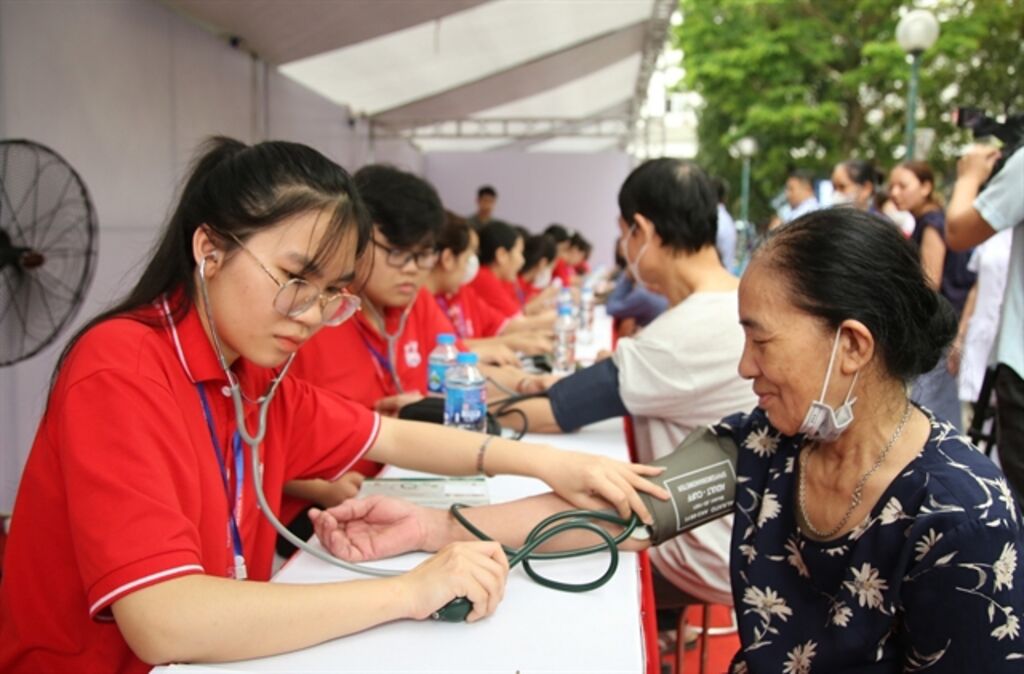 |
| People are screened for cardiovascular and chronic kidney diseases at the event in Hanoi__Photo: VNA |
Hundreds of thousands of people will be screened for cardiovascular and chronic kidney diseases through AI platforms this year, and over 20,000 patients will be advised to undergo testing to assess chronic kidney disease.
This is the aim of the "CAREME" - Cardiovascular, Kidney, and Metabolic Health Care Program, which was launched by the Vietnam Young Physicians’ Association at the National Hospital of Endocrinology on April 5 in Hanoi, to commemorate World Health Day (April 7) and World Kidney Day (March 14).
Ha Anh Duc, head of the Office of the Ministry of Health and chairman of the Vietnam Young Physicians’ Association (VYPA), said: “Among non-communicable diseases, chronic kidney disease is a progressive condition with a high prevalence rate, often undiagnosed and insufficiently addressed."
According to Duc, this imposed a burden on patients, families, society, as well as the national healthcare system.
However, the rate of missed diagnosis of chronic kidney disease remained very high, especially in the early stages due to atypical symptoms, with only about 4.5-15.5 percent of stage 3 chronic kidney disease patients being diagnosed.
The missed diagnosis rate was particularly high among high-risk groups such as those with hypertension and diabetes.
Thus, the "CAREME" program aims to strengthen and sustain the system of cardiovascular, kidney and metabolic health care through early disease detection, improving quality standards in disease management, enhancing clinical outcomes, and reducing healthcare burdens in Vietnam.
The program supported screening platforms and organized health check-ups and disease screening for 1,000 people at risk of cardiovascular and chronic kidney diseases at the event.
Additionally, it provided healthcare software installation and chronic disease management for hundreds of people.
The program of the Young Vietnamese Physicians' Association and its partners will focus on mobilizing community participation, specialized units, and organizations to collectively enhance diagnostic capabilities, improve treatment quality, and manage non-communicable chronic diseases through the deployment of digital tools.
It is estimated that there are over 8.7 million adults suffering from chronic kidney disease, accounting for 12.8 percent of the population in Vietnam.
Alongside this, the economic cost related to the treatment of chronic kidney disease could amount to billions of dollars each year, accounting for 2.4 - 7.5 percent of the nation's annual healthcare expenditure, with particularly high costs for dialysis.
In Vietnam, in 2019, the management costs of chronic kidney disease exceeded the average GDP per capita, with dialysis costs being four times the costs of treating early-stage chronic kidney disease. Early diagnosis and treatment of chronic kidney disease, as well as slowing down the progression of kidney function decline, will bring significant long-term economic benefits while also reducing the burden on the healthcare sector.
Currently, there are over 400 artificial kidney units in the country, providing dialysis services to around 30,000 end-stage kidney disease patients each year, yet only meeting 30 percent of the nationwide demand for dialysis services.- (VNS/VLLF)









